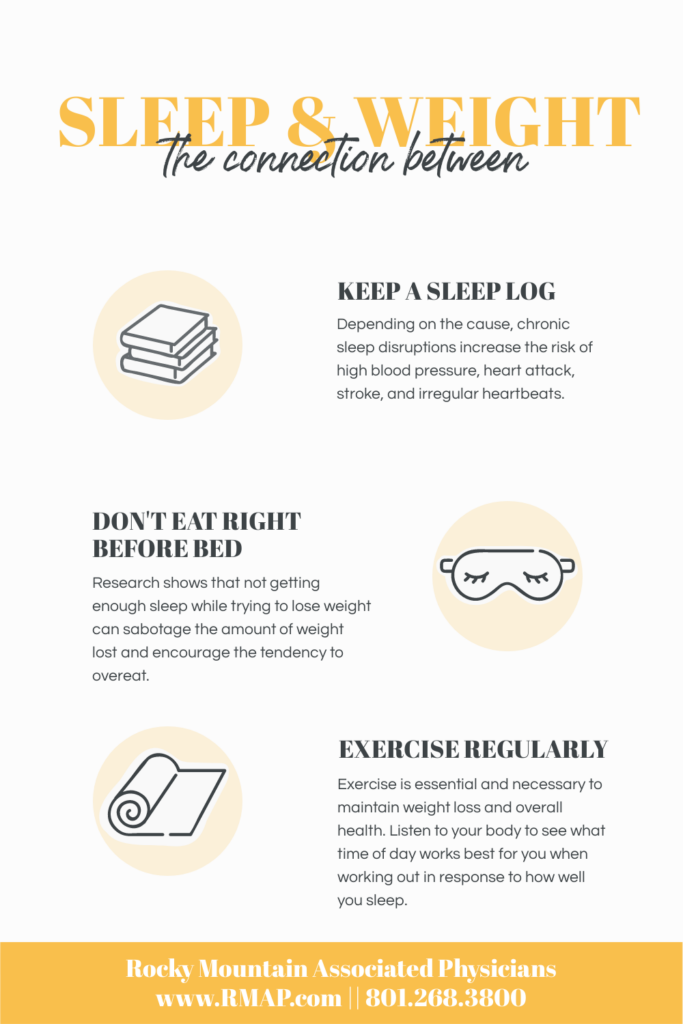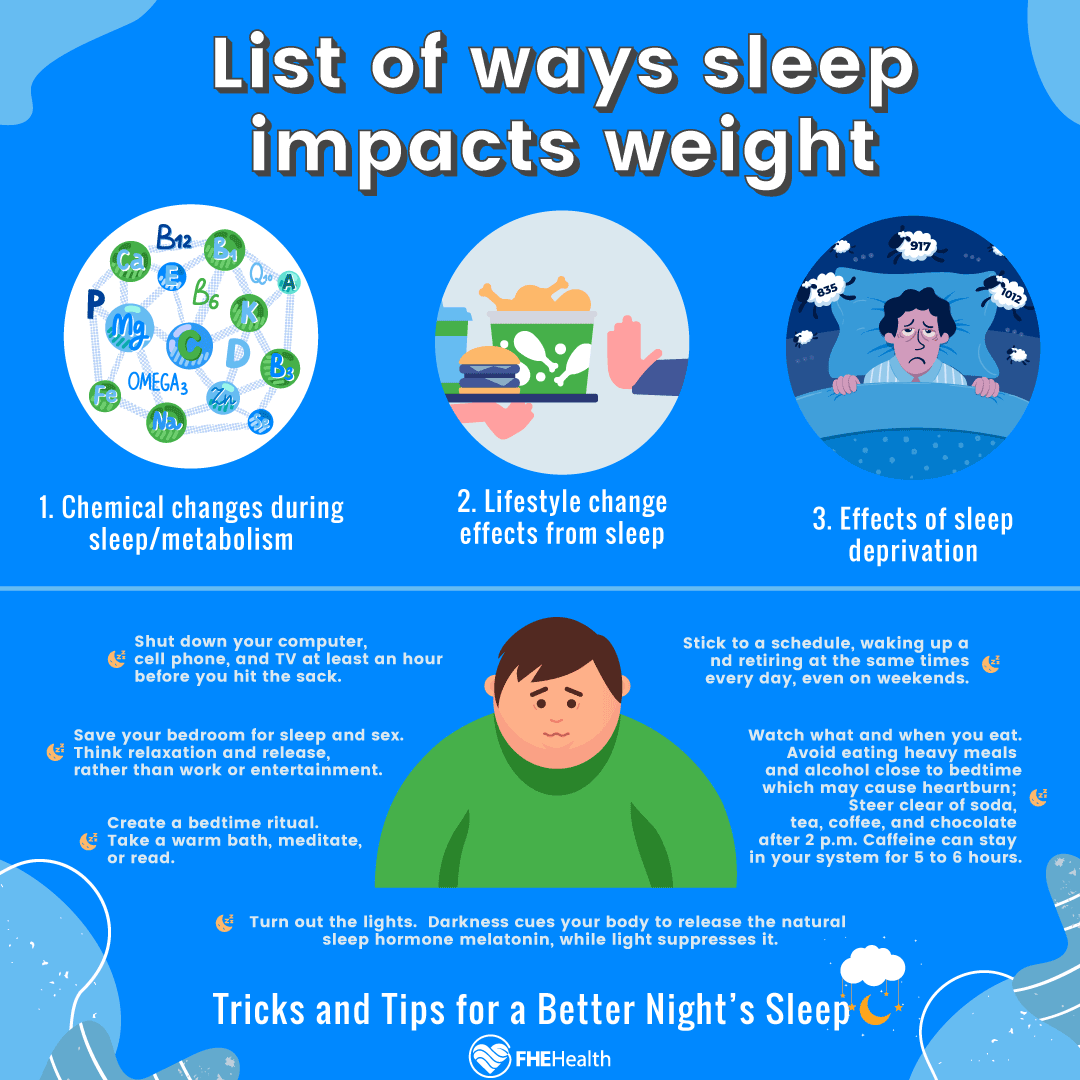Have you ever wondered how your sleep patterns might be affecting your waistline? You’re not alone.
The connection between sleep and weight is one that often goes unnoticed, yet it plays a crucial role in your overall health and well-being. Imagine waking up every morning feeling refreshed, energetic, and ready to take on the day. Sounds appealing, right?
By understanding the fascinating link between sleep and weight, you can unlock the secret to not just a healthier body, but also a happier life. Dive into this article to discover how a good night’s sleep might be the missing piece in your weight management puzzle. Let’s explore how you can harness the power of sleep to achieve the results you’ve been dreaming about.

Credit: blog.ccmhhealth.com
Impact Of Sleep On Weight
Quality sleep plays a crucial role in maintaining a healthy weight. Poor sleep can disrupt hunger hormones, leading to increased appetite and weight gain. Consistent rest supports better metabolism and energy balance, helping manage weight effectively.
Understanding the Impact of Sleep on Weight is crucial if you’re on a journey to manage or lose weight. Sleep is not just about feeling rested; it plays a key role in regulating your body’s functions, including your metabolism. Lack of sleep can throw off your body’s natural balance, making weight management harder than it needs to be.
How Sleep Affects Metabolism
Sleep influences how your body processes and stores energy from food. When you don’t get enough sleep, your metabolism can slow down. This means your body burns fewer calories, even when you’re at rest. Missing out on sleep can also affect the hormones that control hunger. You might find yourself reaching for sugary snacks or extra helpings without realizing why.
The Role Of Hormones
Two key hormones, ghrelin and leptin, play a big part in hunger and fullness. Ghrelin tells your brain when it’s time to eat, while leptin signals when you’re full. Lack of sleep can increase ghrelin and decrease leptin, making you feel hungrier than usual. Have you ever noticed feeling hungrier after a poor night’s sleep? That’s your hormones sending mixed signals.
Real-life Impact: A Personal Reflection
I remember a time when I was juggling work deadlines and barely sleeping. Despite eating well and exercising, I couldn’t lose those extra pounds. It was only after improving my sleep habits that I saw real progress in weight loss. This experience taught me that sleep is just as important as diet and exercise in a weight loss journey.
Practical Tips For Better Sleep
– Set a Consistent Sleep Schedule: Go to bed and wake up at the same time every day, even on weekends. – Create a Relaxing Bedtime Routine: Try reading a book or taking a warm bath before bed. – Limit Screen Time Before Sleep: The blue light from devices can interfere with your sleep. What changes can you make today to improve your sleep?
Conclusion: Make Sleep A Priority
Sleep affects every aspect of your life, including your weight. By prioritizing quality sleep, you set yourself up for better health and successful weight management. Consider how much better you feel after a good night’s sleep. Isn’t it worth making it a priority?

Credit: utahbariatrics.com
Sleep Duration And Weight
Understanding the link between sleep duration and weight can be a game-changer in your health journey. How much sleep you get each night may significantly impact your weight. It’s not just about how many hours you’re in bed but the quality of your sleep that counts.
Short Sleep And Weight Gain
Have you ever noticed that after a night of tossing and turning, you feel ravenous the next day? You’re not alone. Studies have shown that sleeping less than six hours can increase hunger and cravings for high-calorie foods.
When you don’t sleep enough, your body releases more of the hunger hormone, ghrelin. This can lead to overeating and, ultimately, weight gain. You might find yourself reaching for that extra cookie or indulging in late-night snacks more often.
Think about this: could adjusting your sleep schedule be the missing link in your weight management plan? Try setting a bedtime that allows for at least seven hours of sleep. It might just help keep those unwanted pounds at bay.
Long Sleep And Weight Maintenance
On the flip side, sleeping more than nine hours might not be ideal. While adequate sleep is crucial, oversleeping can sometimes indicate underlying health issues, like depression or sleep apnea, which can affect weight.
However, getting the right amount of sleep—typically between seven to nine hours—can help maintain your weight. This sleep duration supports balanced hormone levels, keeping hunger in check and energy levels up.
Why not try tracking your sleep patterns for a week? See if there’s a correlation between how much sleep you get and your eating habits. You might discover that finding your sleep sweet spot helps you maintain a healthy weight effortlessly.
Remember, your body is unique. Listen to it and find a sleep duration that works for you. Could this be a crucial step in achieving your weight goals?
Sleep Quality And Metabolism
Sleep is not just about feeling rested. It plays a critical role in maintaining your body’s metabolism. Poor sleep quality can lead to weight gain and other health issues. Understanding how sleep and metabolism are linked can help you make better choices for your health.
Role Of Deep Sleep
Deep sleep is crucial for your body’s recovery. During this phase, your body repairs tissues and builds muscle. It also stabilizes your metabolism.
Think about the nights when you woke up feeling genuinely refreshed. Chances are you had enough deep sleep. This stage helps regulate hormones that control hunger and energy use.
If you skimp on deep sleep, your body might produce more ghrelin, the hormone that makes you feel hungry. You’ll likely crave high-calorie foods, which can lead to weight gain.
Sleep Disruptions And Metabolic Rate
Ever noticed how your mood and energy dip after a night of tossing and turning? Sleep disruptions can affect your metabolic rate. Frequent awakenings or poor sleep patterns might slow down your metabolism.
Think of your metabolism as a car engine. Constant disruptions are like stop-and-go traffic. Your body struggles to burn calories efficiently. This can lead to weight retention.
To improve your sleep quality, consider creating a relaxing bedtime routine. Avoid screens and caffeine before bed. Your body will thank you with better metabolism and more energy.
Have you ever tried tracking your sleep patterns? It might reveal insights that could change your health for the better. Understanding your sleep can empower you to make impactful changes.
Hormones Influenced By Sleep
When you’re chasing dreams at night, your body does more than just rest. Sleep is a powerhouse that influences key hormones linked to weight management. Ever wondered why you feel hungrier after a sleepless night? Or why stress seems to pile on the pounds? Let’s dive into the hormonal shifts that occur while you’re catching those z’s.
Leptin And Ghrelin
Leptin and ghrelin are like the body’s hunger gauges. Leptin tells your brain that you’re full, while ghrelin signals hunger. Lack of sleep can tip the balance between these two hormones.
Imagine waking up after five hours of sleep. Your leptin levels drop, and ghrelin levels rise, making you crave that extra slice of pizza. This hormonal change can lead to overeating and weight gain. Prioritizing good sleep can help keep these hormones in check.
Cortisol Levels
Ever noticed how a stressful day with little sleep makes you anxious? Cortisol, the stress hormone, plays a part in this. Sleep deprivation can elevate cortisol levels, leading to increased fat storage.
Higher cortisol levels can also make you feel constantly hungry, even if you’ve just eaten. This can be a sneaky culprit behind weight gain. Consider managing stress with regular sleep to keep cortisol in balance.
So, what can you do to harness these hormones for better weight control? Think about how you can improve your sleep routine. Would setting a consistent bedtime help? Could reducing screen time before bed make a difference?
By understanding the link between sleep and hormones, you can take steps toward a healthier lifestyle. Sleep isn’t just a passive activity; it’s an active process that supports weight management. What changes will you make to ensure your hormones work for you, not against you?
Sleep Disorders And Obesity
Sleep and weight are closely linked. Obesity often arises from sleep disorders. Disrupted sleep affects metabolism and appetite regulation. This leads to weight gain over time. Understanding sleep disorders can help manage obesity effectively.
Sleep Apnea
Sleep apnea is a common sleep disorder. It involves repeated breathing interruptions during sleep. These interruptions reduce sleep quality. Poor sleep increases hunger hormones. Craving for high-calorie foods often follows.
Obesity is a major risk factor for sleep apnea. Excess fat around the neck can block airways. This worsens breathing issues during sleep. Addressing sleep apnea can aid weight loss. Improved sleep supports better metabolism.
Insomnia And Weight Challenges
Insomnia makes falling or staying asleep difficult. It often leads to fatigue and low energy. This increases the likelihood of poor food choices. Many turn to sugary foods for quick energy boosts.
Chronic insomnia disrupts hormone balance. Stress hormones increase, promoting fat storage. Sleep deprivation also decreases metabolism efficiency. Insomnia sufferers often face weight challenges as a result.

Credit: fherehab.com
Lifestyle Choices For Better Sleep
Balancing sleep and weight is important for health. Good sleep helps maintain a healthy weight. Poor sleep can lead to weight gain.
Lifestyle Choices for Better Sleep Quality sleep is often a reflection of the choices you make during the day. Your habits—what you eat, how you move, and even when you go to bed—can significantly impact your nightly rest. If you’ve ever tossed and turned, you know how frustrating it can be. But what if a few simple lifestyle tweaks could help you sleep like a baby?
Diet And Sleep Quality
What you eat plays a crucial role in how well you sleep. Ever notice how a heavy dinner can leave you restless? Foods high in fat or sugar can disrupt your sleep cycle. Consider swapping your late-night snack with something light. A handful of almonds or a banana can make a difference. These options are not only satisfying but also contain sleep-friendly nutrients like magnesium and potassium. Think about your caffeine intake too. That afternoon coffee might give you a boost, but it could also keep you awake later. Try switching to herbal tea after lunch.
Exercise And Sleep Patterns
Exercise is a powerful tool for improving sleep. Regular physical activity can help you fall asleep faster and deepen your rest. Have you ever noticed how a good workout leaves you feeling pleasantly tired? The timing of your exercise matters too. Morning workouts can set a positive tone for your day and help regulate your sleep-wake cycle. However, if you exercise too close to bedtime, it might leave you too energized to sleep. Start with a simple routine. A daily walk or a short yoga session can work wonders for your sleep patterns. What small change can you make today to move more? Your everyday choices can transform your sleep quality. Which of these habits will you try first to improve your sleep?
Strategies For Weight Management
Weight management involves more than just diet and exercise. Quality sleep plays a crucial role. Good sleep helps control hunger and boosts metabolism. It supports your body’s natural weight regulation processes.
Explore these strategies to manage weight through better sleep habits. Make small changes for big results.
Creating A Sleep Routine
A consistent sleep schedule can improve your health. Go to bed and wake up at the same time daily. This helps regulate your body’s internal clock. It also enhances sleep quality.
Limit screen time before bed. Blue light from devices can disrupt sleep. Create a calming bedtime ritual. Read a book or listen to soft music. These activities signal your body to relax and prepare for rest.
Mindfulness And Stress Reduction
Stress affects sleep and weight. Mindfulness can help reduce stress. Practice deep breathing or meditation daily. These techniques calm the mind and promote relaxation.
Journaling can also aid stress relief. Write about your day or express gratitude. This practice clears your mind, making sleep easier. Less stress leads to better sleep and improved weight management.
Frequently Asked Questions
How Does Sleep Affect Weight?
Sleep impacts hormones that regulate hunger and metabolism. Lack of sleep can increase appetite, leading to weight gain. Adequate sleep helps maintain a healthy weight by balancing these hormones. It also improves energy levels, making it easier to engage in physical activity, which supports weight management.
Can Poor Sleep Lead To Weight Gain?
Yes, poor sleep can lead to weight gain. Insufficient sleep disrupts hormones like ghrelin and leptin, increasing hunger and cravings. This disruption often results in overeating and weight gain. Moreover, tiredness from poor sleep can decrease motivation for physical activities, further contributing to weight gain.
What Is The Relationship Between Sleep And Metabolism?
Sleep is crucial for a healthy metabolism. During sleep, the body regulates insulin and processes glucose efficiently. Lack of sleep can lead to insulin resistance, slowing metabolism. A slow metabolism can contribute to weight gain. Thus, good sleep supports a healthy, active metabolism, aiding in weight control.
How Much Sleep Is Needed For Weight Management?
For effective weight management, adults should aim for 7 to 9 hours of sleep each night. Adequate sleep helps regulate appetite-controlling hormones. It also supports metabolism and energy levels, making it easier to maintain a healthy weight through balanced diet and exercise.
Conclusion
Healthy sleep aids weight control. Lack of sleep can lead to weight gain. Quality sleep supports metabolism and curbs cravings. Restful nights help balance hormones. Your body needs sleep to function well. Prioritize good sleep habits for better health. Aim for seven to nine hours each night.
Create a relaxing bedtime routine. Limit screen time before bed. Avoid caffeine late in the day. A peaceful sleep environment boosts sleep quality. Choose comfort over noise. Better sleep brings better health. It’s more than rest—it’s a foundation for wellness.
Sleep well, live well.
